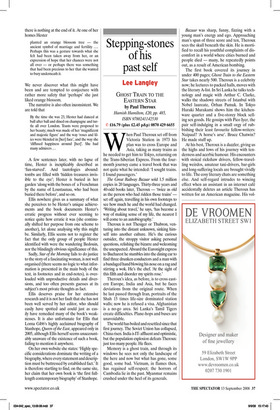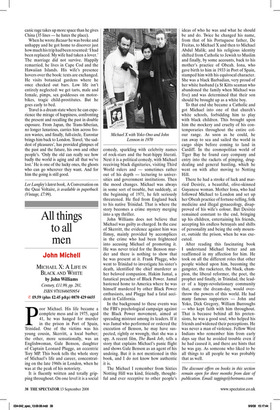Stepping-stones of his past self
Lee Langley
GHOST TRAIN TO THE EASTERN STAR by Paul Theroux Hamish Hamilton, £20, pp. 485, ISBN 9780241142530 ✆ £16.79 (plus £2.45 p&p) 0870 429 6655 When Paul Theroux set off from Victoria Station in 1973 his plan was to cross Europe and Asia, taking as many trains as he needed to get him to Tokyo, returning on the Trans-Siberian Express. From the fourmonth journey came a travel book that was not quite what he intended: ‘I sought trains. I found passengers.’ The Great Railway Bazaar sold 1.5 million copies in 20 languages. Thirty-three years and 40-odd books later, Theroux — ‘twice as old as the person who had ridden those trains’ — set off again, travelling in his own footsteps to see how much he and the world had changed. ‘Writing about travel,’ he says, ‘has become a way of making sense of my life, the nearest I will come to an autobiography.’ Theroux is not Thesiger or Thubron, venturing into the distant unknown, sinking himself into another culture. He’s the curious outsider, the stroppy visitor asking personal questions, relishing the bizarre and welcoming the unexpected. Aboard the Euronight express to Bucharest he stumbles into the dining car to find three drunken conductors and a man with a bandaged hand blowing his nose on a rag and stirring a wok. He’s the chef. ‘At the sight of this filth and disorder my spirits rose.’ Theroux’s idea, as before, is to cross eastern Europe, India and Asia, but he faces deviations from the original route. When he last passed through Iran, portraits of the Shah 15 times life-size dominated station walls; now he is refused a visa. Afghanistan is a no-go area. Sri Lanka’s Tamil Tigers create difficulties. Plane-hops and buses are unavoidable.
The world has boiled and resettled since that first journey. The Soviet Union has collapsed, China risen. India is ITaffluent and optimistic, but the population explosion defeats Theroux: just too many people. He flees.
Memory is a ghost train, and through its windows he sees not only the landscape of the here and now but what has gone, some good, some bad. Vietnam, in flames then, has regained self-respect; the horrors of Cambodia lie in the past. Myanmar remains crushed under the heel of its generals. Bazaar was sharp, funny, fizzing with a young man’s energy and ego. Approaching man’s span of three score and ten, Theroux sees the skull beneath the skin. He is mortified to recall his youthful complaints of discomfort in a world where cities burned and people died — many, he repeatedly points out, as a result of American bombing.
The first book covered its journey in under 400 pages; Ghost Train to the Eastern Star takes nearly 500. Theroux is a celebrity now; he lectures to packed halls, moves with the literary A-list. In Sri Lanka he talks technology and magic with Arthur C. Clarke, walks the shadowy streets of Istanbul with Nobel laureate, Orhan Pamuk. In Tokyo Huraki Murakami shows him the kitchenware quarter and a five-storey block selling sex goods. He gossips with Pico Iyer, the pair self-indulging in a small orgy of rubbishing their least favourite fellow-writers: Naipaul? ‘A horse’s arse’. Bruce Chatwin? He made stuff up.
At his best, Theroux is a dazzler, giving us the highs and lows of his journey with tenderness and acerbic humour. His encounters with stoical rickshaw drivers, fellow-travelling weirdos, amateur taxi-drivers, bar-girls and long-suffering locals are brought vividly to life. The cosy literary chats are something else. And self-regard intrudes to wincing effect when an assistant in an internet café accidentally deletes an article Theroux has written for an American magazine. His vol canic rage takes up more space than he gives China (35 lines — he hates the place).
When he wrote Bazaar he was broke and unhappy and he got home to discover just how much his trip had been resented: ‘I had been replaced. My wife had taken a lover.’ The marriage did not survive. Happily remarried, he lives in Cape Cod and the Hawaiian Islands. His wife’s presence hovers over the book: texts are exchanged. He visits botanical gardens where he once checked out bars. Low life isn’t entirely neglected: we get tarts, male and female, pimps, sex goddesses on motorbikes, tragic child-prostitutes. But he goes early to bed.
Travel is a dream state where he can experience the mirage of happiness, confronting the present and recalling the past in double exposure. From Japan, the Trans-Siberian, no longer luxurious, carries him across frozen wastes, and finally, full-circle, Eurostar brings him back to London. Travel, ‘the saddest of pleasures’, has provided glimpses of the past and the future, his own and other people’s. ‘Only the old can really see how badly the world is aging and all that we’ve lost.’ He is one of the lucky ones, the ghosts who can go wherever they want. And for him the going is still good.











































































 Previous page
Previous page